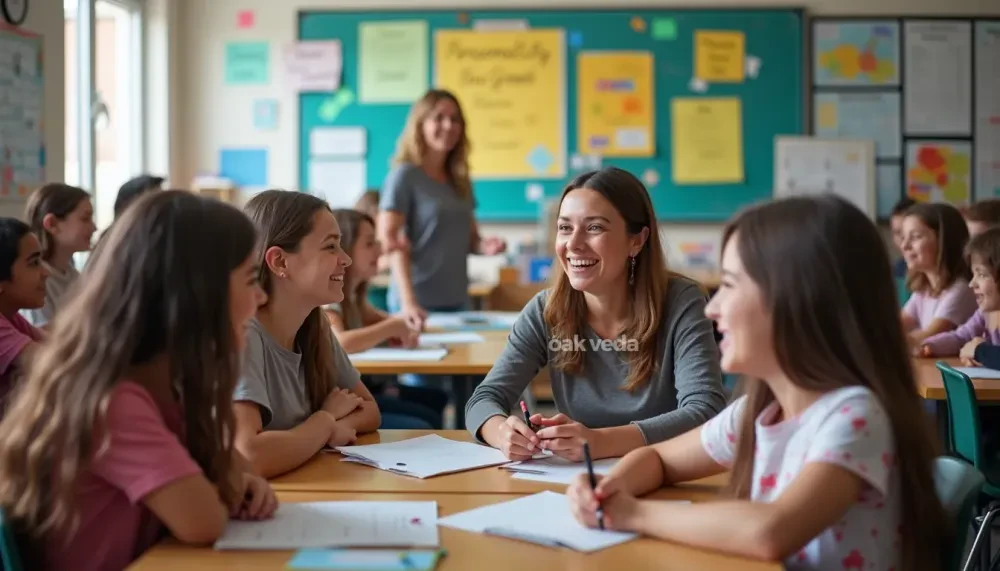
Introduction
Personality development is a process aimed at enhancing an individual's psychological characteristics, focusing on fostering positive changes and discovering innate skills and strengths. By investing time in personality development, students can experience significant growth, both academically and socially.
The importance of personality development in student growth cannot be overstated. It plays a crucial role in building self-esteem, improving communication skills, and preparing students for future challenges. Through various activities and programs, students learn to harness their potential and navigate complex social dynamics effectively.
Five surprising benefits of personality development for students include:
- Enhanced Confidence: Activities that promote self-awareness and self-improvement help students build robust self-confidence.
- Improved Interpersonal Skills: Developing emotional intelligence through targeted exercises enhances students' social interactions.
- Better Academic Performance: Integrating personality development into study routines leads to improved academic outcomes.
- Enhanced Creativity and Critical Thinking Skills: Encouraging innovative thinking through brainstorming activities fosters creativity.
- Preparation for Adulthood: Equipping students with essential life skills like time management and goal setting prepares them for future success.
By incorporating these elements into the educational framework, schools can ensure a holistic approach to student development.
1. Enhanced Confidence
Boosting confidence among students is one of the most significant benefits of personality development. Engaging in activities designed to build self-esteem and enhance confidence-building skills can have a transformative effect on students' lives.

Personality development activities often include:
- Public speaking sessions=: These help students articulate their thoughts clearly and confidently.
- Group discussions and team projects: These foster collaboration and the ability to express ideas within a group setting.
- Role-playing exercises: These simulate real-life scenarios, allowing students to practice decision-making and leadership skills.
For instance, consider Emma, a shy high school student who struggled with self-doubt. After participating in a series of confidence-building workshops that included public speaking and team projects, she noticed a remarkable change in her demeanor. She became more assertive in class discussions and even took on leadership roles within her school community.
Enhanced confidence positively impacts academic performance by:
- Encouraging active participation in class, leading to better understanding and retention of material.
- Reducing anxiety during exams or presentations, which can improve overall grades.
- Fostering a growth mindset where students are more willing to take on challenging tasks.
Social interactions also benefit from increased self-confidence. Students who feel good about themselves typically find it easier to make friends, collaborate effectively, and navigate social situations with ease. This can lead to:
- Stronger peer relationships
- Improved teamwork skills
- Greater resilience in facing social challenges
Personality development programs that focus on building self-confidence can create an environment where students thrive academically and socially. They not only help students succeed in the classroom but also prepare them to face future challenges with assurance and poise.
You may be interested in:
2. Improved Interpersonal Skills
Emotional intelligence (EI) refers to the ability to understand and manage your own emotions, as well as recognize and influence the emotions of others. For students, enhancing emotional intelligence is pivotal in building strong interpersonal relationships. High EI contributes to better teamwork, empathy, and conflict resolution skills, making it an essential aspect of personal development.
Importance of Effective Communication Skills
Effective communication is a cornerstone of academic success and future professional endeavors. Good communication skills enable students to express their ideas clearly, ask questions for better understanding, and engage meaningfully with peers and teachers. Key benefits include:
- Academic Success: Students who communicate well are more likely to participate in class discussions, seek help when needed, and collaborate effectively on group assignments.
- Professional Preparedness: In the professional world, clear communication is crucial for networking, customer relations, and teamwork. Developing these skills early ensures that students are well-prepared for future career challenges.
By focusing on emotional intelligence and social skills through targeted personality development activities, students can significantly improve their interpersonal relationships. This holistic approach not only enhances their current academic performance but also equips them with essential life skills for future success.
3. Better Academic Performance
Personality development initiatives can significantly boost academic success for students by enhancing both their study habits and intrinsic motivation.
Connection Between Personality Development and Academic Outcomes
When students engage in personality development activities, they often experience a surge in self-confidence and self-awareness. These activities help them discover their strengths and weaknesses, which can be directly applied to their academic pursuits. Recognizing one’s capabilities allows students to approach challenges with a positive mindset, leading to better performance in exams and assignments.
Practical Strategies for Integrating Personality Development into Study Routines
To maximize the effectiveness of personality development principles in daily studies, consider incorporating the following strategies:
- Goal Setting: Encourage students to set clear, achievable academic goals. This keeps them focused and motivated.
- Time Management: Teach effective time management techniques such as the Pomodoro Technique or time-blocking to help students allocate appropriate time for studying and breaks.
- Reflective Practices: Introduce reflective journaling where students can document their learning experiences and emotional responses. This helps them understand their learning patterns and emotional triggers.
Intrinsic Motivation and Personal Growth
Intrinsic motivation plays a crucial role in fostering a conducive environment for learning. When students feel personally invested in their growth, they are more likely to embrace challenges and persist through difficulties. Personality development programs that emphasize personal growth can ignite this intrinsic motivation by:
- Boosting Self-Esteem: Activities that enhance self-esteem make students feel more capable of tackling academic tasks.
- Fostering a Growth Mindset: Encouraging a growth mindset helps students view failures as opportunities for learning rather than setbacks.
- Building Resilience: Resilience training equips students with the mental fortitude to handle academic pressures effectively.
By integrating these personality development strategies into educational frameworks, schools can create an environment where students not only achieve better grades but also develop essential life skills that contribute to lifelong success.
4. Enhanced Creativity and Critical Thinking Skills
Nurturing creativity through targeted personality development interventions is essential for students. Engaging in activities that stimulate innovative thinking can greatly enhance a student's ability to think outside the box.

Engaging Brainstorming Activities
- Mind Mapping: A visual tool that helps students organize their thoughts, enabling them to see connections between different ideas.
- Group Discussions: Encourages the sharing of diverse perspectives, fostering a collaborative environment where new ideas can flourish.
- Problem-Solving Challenges: Presents students with real-world problems, pushing them to devise creative solutions.
These activities not only make learning more interactive but also promote a culture of innovation within the educational setting.
Importance of Well-Developed Critical Thinking Skills
Critical thinking skills are crucial for students' preparedness to tackle future challenges. Developing these skills allows students to:
- Analyze Information: Assess the validity and reliability of different sources.
- Make Informed Decisions: Evaluate various options and choose the most effective course of action.
- Solve Complex Problems: Break down complicated issues into manageable parts and develop logical solutions.
Students equipped with strong critical thinking abilities are better prepared for both academic success and professional endeavors.
Impact on Future Preparedness
Well-developed creativity and critical thinking skills prepare students to navigate an increasingly complex world. These competencies are not only relevant in academic settings but also essential in everyday life. For instance:
By embracing innovative thinking, students can adapt more readily to changes and uncertainties, making them resilient in the face of challenges. This adaptability is vital as they transition into adulthood, where problem-solving and decision-making become integral parts of their daily lives.
5. Preparation for Adulthood: Life Skills Development Through Personality Enhancement Programs
Comprehensive personality enhancement programs in schools are crucial for developing essential life skills in students. These programs go beyond academic knowledge, offering practical tools that prepare students for the complexities of adult life.
Essential Life Skills Developed
**1. **Effective Time Management
Students learn to prioritize tasks, set realistic deadlines, and manage their schedules. This skill is crucial for balancing various responsibilities in adulthood, from career demands to personal obligations.
**2. **Adaptability
Adaptability is about being flexible and open to change. Personality development programs encourage students to embrace new challenges and adjust to different situations, a vital trait for thriving in dynamic environments.
**3. **Goal Setting
Setting clear, achievable goals is fundamental for success. Students are taught to outline their aspirations, create actionable plans, and stay motivated throughout their journey. This instills a sense of purpose and direction.
**4. **Public Speaking
Confidence in public speaking enhances communication skills and self-expression. Activities like debates, presentations, and group discussions help students articulate their thoughts clearly and confidently, an invaluable asset in both professional and social settings.
Investing in these life skills through personality enhancement programs helps bridge the gap between academic learning and real-world requirements. This holistic approach ensures that students are not only knowledgeable but also well-equipped to face the challenges of adulthood confidently.
Conclusion: Embracing a Holistic Approach to Education by Prioritizing Personality Development Initiatives in Schools
Investing in student growth through personality development fosters holistic development and ensures long-term personal growth and future success. By integrating personality enhancement as a key component of education, students gain confidence, interpersonal skills, academic performance, creativity, and life skills.
What Can We Do?
- Educators: Implement personality development programs within the curriculum.
- Parents: Encourage personal growth activities at home.
- Policymakers: Advocate for policies that support holistic educational approaches.
Prioritizing these initiatives boosts students' confidence and skills, laying a strong foundation for their future.
FAQs (Frequently Asked Questions)
What is personality development and why is it important for students?
Personality development refers to the process of enhancing one's personality traits, skills, and emotional intelligence. It is crucial for students as it contributes to their growth, boosts confidence, improves interpersonal skills, and prepares them for future challenges.
How does personality development enhance student confidence?
Personality development activities foster self-confidence by providing students with opportunities to engage in various challenges and experiences. Real-life examples show that students who participate in these activities often experience significant boosts in their self-esteem, positively impacting their academic performance and social interactions.
In what ways can personality development improve academic performance?
Personality development initiatives are linked to improved academic outcomes as they help cultivate intrinsic motivation and effective study habits. By integrating personality development principles into their routines, students can create a conducive environment for better learning results.
What role do interpersonal skills play in a student's success?
Interpersonal skills, including emotional intelligence and effective communication, are essential for building strong relationships within educational settings. These skills not only contribute to academic success but also prepare students for future professional endeavors.
How can personality development nurture creativity and critical thinking in students?
Targeted personality development interventions can stimulate creativity through engaging brainstorming activities. Well-developed critical thinking skills enable students to tackle future challenges effectively, fostering innovative thinking abilities that are vital in today's world.
What life skills can be developed through personality enhancement programs?
Comprehensive personality enhancement programs can cultivate essential life skills such as time management, adaptability, goal setting, and public speaking. These skills are significant for navigating adulthood successfully and contribute to a holistic approach to education.

